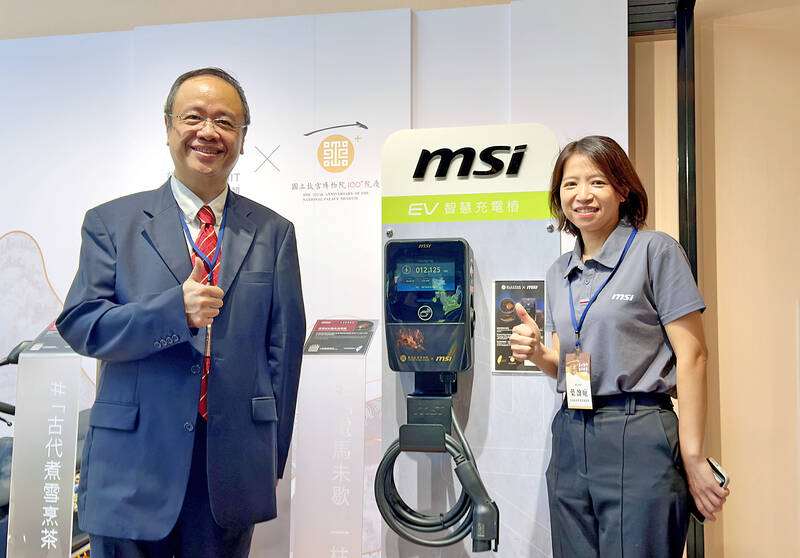PC and motherboard maker Micro-Star International Co (MSI, 微星科技) yesterday said it expected to sell its electric vehicle (EV) charging piles in at least 10 countries by the end of this year and 20 countries next year.
The company is partnering with Taiwanese automakers to sell cobranded charging piles in the domestic market, MSI electric vehicle supply equipment business division marketing manager Tina Chang (張婷然) said on the sidelines of an event in Taipei.
The company has begun selling the products in Japan, Thailand and Australia, with sales in the US and Canada set to begin next month, and South Korea next quarter, Chang said.

Photo: Fang Wei-chieh, Taipei Times
The company is in talks with South Korean and Japanese automakers to seek new business opportunities, and aims to secure a 3 percent share at the global market by 2030, she said.
MSI’s charging piles are designed for use in residential buildings, and the company has a double-digit share of Taiwan’s home-use charging pile market, MSI marketing vice president Sam Chern (程惠正) said.
The company is partnering with automakers, shopping malls and charging station operators to increase its market share, and plans to launch a new thin DC charging pile for commercial complexes as early as the end of this year, Chern said.
The company is developing a new energy storage charging pile and aims to commercialize the product within a year, with plans to target home-use markets in Japan, Europe, the US and Canada, he said.
The company expects long-term growth in the EV market, he said, adding that the US government’s plan to discontinue subsidies for EV purchases would not have a significant impact on its charging pile business.
Meanwhile, the company said it remains positive about its graphics card, motherboard and gaming PC business in the second half of this year, citing strong demand for artificial intelligence applications and Nvidia Corp’s gaming products.

In Italy’s storied gold-making hubs, jewelers are reworking their designs to trim gold content as they race to blunt the effect of record prices and appeal to shoppers watching their budgets. Gold prices hit a record high on Thursday, surging near US$5,600 an ounce, more than double a year ago as geopolitical concerns and jitters over trade pushed investors toward the safe-haven asset. The rally is putting undue pressure on small artisans as they face mounting demands from customers, including international brands, to produce cheaper items, from signature pieces to wedding rings, according to interviews with four independent jewelers in Italy’s main

Japanese Prime Minister Sanae Takaichi has talked up the benefits of a weaker yen in a campaign speech, adopting a tone at odds with her finance ministry, which has refused to rule out any options to counter excessive foreign exchange volatility. Takaichi later softened her stance, saying she did not have a preference for the yen’s direction. “People say the weak yen is bad right now, but for export industries, it’s a major opportunity,” Takaichi said on Saturday at a rally for Liberal Democratic Party candidate Daishiro Yamagiwa in Kanagawa Prefecture ahead of a snap election on Sunday. “Whether it’s selling food or

CONCERNS: Tech companies investing in AI businesses that purchase their products have raised questions among investors that they are artificially propping up demand Nvidia Corp chief executive officer Jensen Huang (黃仁勳) on Saturday said that the company would be participating in OpenAI’s latest funding round, describing it as potentially “the largest investment we’ve ever made.” “We will invest a great deal of money,” Huang told reporters while visiting Taipei. “I believe in OpenAI. The work that they do is incredible. They’re one of the most consequential companies of our time.” Huang did not say exactly how much Nvidia might contribute, but described the investment as “huge.” “Let Sam announce how much he’s going to raise — it’s for him to decide,” Huang said, referring to OpenAI

The global server market is expected to grow 12.8 percent annually this year, with artificial intelligence (AI) servers projected to account for 16.5 percent, driven by continued investment in AI infrastructure by major cloud service providers (CSPs), market researcher TrendForce Corp (集邦科技) said yesterday. Global AI server shipments this year are expected to increase 28 percent year-on-year to more than 2.7 million units, driven by sustained demand from CSPs and government sovereign cloud projects, TrendForce analyst Frank Kung (龔明德) told the Taipei Times. Demand for GPU-based AI servers, including Nvidia Corp’s GB and Vera Rubin rack systems, is expected to remain high,